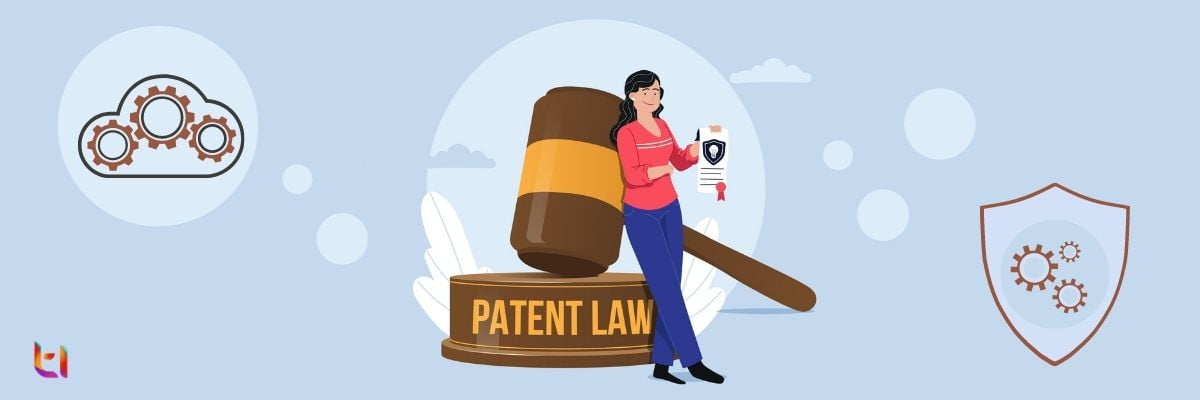Registration For Software Patents
Tech product designers and inventors have always worked hard to protect their intellectual property interests and gain patent registration on their inventions. The exponential development of the internet, along with fierce competition, has demand for tech patents in India. However, in order to meet demand, promote creativity, and protect inventors’ interests, the Indian Patent Office has established comprehensive guidelines for patenting Computer Related Inventions. The patentability of software is the subject of this paper.
Patents
Patents created a limited amount of intellectual property. Just 3% of Indian firms in the top 100 software firms in India had some patents granted in the United States between 1996 and 2003, while one-third of foreign-owned software firms had US patents awarded during this period.
Copyright
Copyrights are a more popular, although less effective, means of defending intellectual property in software than patents. Between 1996 and 2003, 18% of the top Indian tech companies had licenced software copyrights in the United States. In India, more foreign-owned tech corporations licenced copyrights in the United States than Indian companies.
Patent Protection
Since software continues to fall under existing subject matter under Indian law, India does not grant patents for software (i.e., business method, algorithm Software with a mechanical result that is part of a physical device, on the other hand, is patentable. Pure tech patenting is currently being discussed at a high level in India. The concerns include the degree to which software patents inconvenience social profit, the utility of 20-year patents in a market with accelerated technical obsolescence, and the extent to which software patent applications satisfy the non-obvious criteria. In India, there has been a revolution in the way software patents are treated.
Copyright Defending
In some cases, Indian software copyright protection follows international requirements, but not in others. In specific, Indian law does not prohibit the copying of a properly licenced software package for use on multiple devices, and it does permit the making of multiple copies of software for non-commercial purposes. The regulation of software copyright rights is a more severe mistake. Since evidence is challenging and fines are limited, Inventions in the Computing Field
Tech-related developments are those that include the use of computers, computer networks, or other programmable devices, as well as those that include the use of a computer programme or systems to run.
Are Software Patents Allowed in India?
Software by itself is not patentable in India.The Patents (Amendments) Act 2002 states that a computer programme is not patentable in and of itself. It’s crucial to remember that only the term “computer software” has the words “per se” associated with it. The terms “exempt from patent registration” are not added to all other products. The general dictionary definition of “per se” is “by itself” or “in itself” or “as such” or “intrinsically” – to imply that you are referring to something that happens independently of other things. As a consequence, software will not be patentable in and of itself. Software that is part of a Computer Related Invention, on the other hand, is patentable.
Laws for filing software patents in India
The Patents (Amendment) Act 2002, which took effect on May 20, 2003, regulates patent registration in India. The following forms of inventions is expressly exempt from patent registration in the Patents Amendment Act of 2002:
- A mathematical or business tool, as well as a computer programme or algorithms in general.
- Any literary, dramatic, musical, or creative work, as well as cinematographic and television films, are examples of aesthetic creations.
- A simple scheme, law, or procedure for performing a mental act or playing a game.
- Knowledge is presented.
- Integrated circuit topography.
Criteria for software patent eligibility
- Individuals must meet the following requirements to be eligible for software copyright:
- The art must be exclusive and based on the creator’s abilities and experience.
- The software patent does not apply to a computer that can only generate algorithms and tables.
- Before releasing the software in any other region, the developer must first release it in India. In the event that the author publishes in another region, the copyright must be owned by an Indian person.
- The Copyright Act of 1957 awards copyright to the government. However, if there is a technological impact of software, the government can grant a patent on it.
How Do You Register a Software Patent?
Patent registration for software inventions is more difficult than for other inventions. As a result, the first step in obtaining a software patent is to seek the advice of a knowledgeable expert in the field of software patent registration.
In the past, the Indian tech industry had a different business model. This will change in the future. Indian tech firms can not compete on the grounds of being the lowest-cost provider of entry-level personalised software services. The historical Indian benefit of plentiful, low-wage, low-cost labour that is technically skilled and English-speaking is eroding.
As demand catches up with supply in India, wages are increasing, and other countries, especially Ireland and Israel in Europe and China and the Philippines in Asia, are developing their own competitive labour pools. The government issues income tax relief on export earnings.
Rights for owner:
The software patent awards the following intellectual property rights:
- The right to save the job in some electronic format and even to reuse it.
- The right to make available copies of the work.
- The app is shown to the right.
- Any format of the work can be translated.
- Adaptation of the work is being made.
- For the purposes of sale or rental, the work should be sold or rented.
- If a community of people develops the programme, the government gives them all of these protections.
The Best Practices listed below will help you reduce the chance of losing intellectual property while doing business offshore.
Be mindful of your intellectual property rights:
- The first and most important move is to learn about the various initiatives and regulations that the offshore country has implemented to protect intellectual property.
Form an internal team to defend intellectual property:
- Defense of intellectual property is a continuous corporate obligation, not a one-time event. As a result, having a team inside the organisation responsible for overseeing intellectual property, breaches, and other issues is crucial.
Examine the function bodies that may be proprietary or copyrighted:
- It is important to conduct regular assessments of the company’s job bodies in order to recognize copyright protection/patents. When copyrighting, make sure that the exemption is available in the country where the offshore activity/development is taking place.
Experience with offshore vendors:
- If the corporation intends to enter into a vendor agreement with an offshore agency, it must exercise great diligence in researching the vendor’s history of intellectual property abuses.
Define a distinct Intellectual Property :
- Infringement provision and the implications of Intellectual Property Violation when performing a deal with an offshore provider (Some companies sign the contract with the onsite entity of the offshore vendor.
Check all of the team members’ sources:
- It is critical to not only review the offshore team’s resumes, but also to contact the required sources to ensure that the employee does not have a history of IP violations.
Be careful of using illegal apps or third-party goods:
- ‘Preach what you preach,’ as the saying goes. Both the onsite and offshore departments should be actively prohibited from using unlicensed applications or goods.
Get the Central Repository mandatory:
- Enforcing a single registry for all documentation and documentation will increase operational quality while also eliminating the need for multiple placeholders for sensitive documents and code.
Taxxinn provides a simple 3 steps Patent Registration process. Contact us now.


